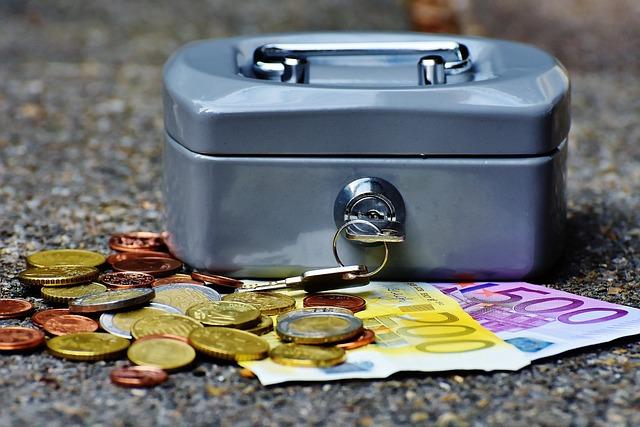Let’s be real-when it comes to managing money, most of us want rapid, no-nonsense advice that actually fits into our busy lives. forget complicated budgets and confusing financial jargon; this article is all about smart and simple finance tips you’ll actually use every day. Whether you’re looking to save a little extra cash, avoid those pesky fees, or just feel more confident about your money moves, these easy-to-follow hacks have got your back. Ready to make your finances work for you, without the fuss? Let’s dive in!
smart Budgeting Hacks That Won’t Drive You Crazy
Let’s be real: budgeting doesn’t have to be a soul-sucking chore. Start by automating your savings so you hardly notice the money leaving your account. Set up small transfers right after payday-think of it as paying your future self first. Then, track your expenses casually using apps that sync with your bank; no need for spreadsheets that look like a calculus exam. This way, you stay aware without feeling overwhelmed. Another hack? Use the envelope method digitally. Allocate a set amount for things like groceries, dining out, and fun money in separate app categories, so you never spend blindly.
Here’s a quick rundown of budgeting tricks that actually stick:
- Round-up savings: Let your bank round up every purchase to the nearest dollar and stash that change away.
- The 50/30/20 rule: Allocate 50% to needs, 30% to wants, and 20% to savings or debt-easy to remember!
- Set weekly spending limits: Instead of monthly, go for weekly ceilings. It keeps things fresh and flexible.
| budget Method | Why it effectively works |
|---|---|
| Automated Savings | Out of sight, out of mind-but growing |
| Digital Envelope | Gives you visual spending limits |
| Weekly Limits | Keeps it fresh & flexible |

Everyday Spending Tweaks That Add Up Big Time
Small changes in daily spending habits can seriously boost your savings without feeling like a sacrifice. Start by swapping your daily coffee shop run for a homemade brew – that $4 saved per cup quickly adds up over weeks and months. Also, try meal prepping; planning your lunches for the week not only cuts back on impulsive takeout but helps you control portions and avoid food waste. Another smart move? Unsubscribe from marketing emails. It might sound odd, but less temptation means fewer unneeded purchases.
Here are some quick tweaks to start saving immediately:
- Auto-roundup savings apps: Let your spare change accumulate automatically.
- Use public transport or carpool: Slash daily commuting costs.
- Switch to cashback or rewards cards: Earn while you spend smartly.
- Limit subscription services: Review and keep only what you truly use.
| Everyday Expense | Old Habit | New Habit | Approx. Monthly Savings |
|---|---|---|---|
| Coffee | Daily coffee shop visit | Home brewed coffee | $80 |
| Lunch | Takeout or fast food | Meal prepping | $100 |
| Transportation | Solo driving | Carpool/public transit | $75 |
| Subscriptions | Multiple streaming apps | Keep 1-2 favorites only | $30 |
Easy Saving Tricks You Can Start Today
Saving money doesn’t have to be complicated or boring. Start small by making a few simple tweaks in your daily routine that add up quickly. As an example,try brewing your own coffee instead of grabbing a pricey latte,or pack your lunch instead of eating out. These tiny changes make a big difference when you stay consistent. Another tip is to automate your savings by setting up a direct transfer to a savings account every payday. Out of sight, out of mind-and your savings grow without you having to think twice!
Here are some quick hacks you can implement today to boost your saving game:
- Use Cashback Apps: Earn money back when you shop online or in-store.
- Cancel Unused Subscriptions: Those forgotten streaming platforms or apps add up.
- Set Spending Limits: Use budgeting apps to control impulse buys.
- Shop with a List: Avoid temptation and buy only what you really need.
| Saving Trick | Estimated Monthly Savings |
|---|---|
| Make Coffee at Home | $30 |
| Pack Lunch Daily | $50 |
| Cancel Extra Subscriptions | $20 |
| Use Cashback Apps | $15 |
Simple Ways to Track Your Money Without Stress
Keeping an eye on your finances doesn’t have to feel like a chore. Start by setting up easy categories for your spending – like groceries, entertainment, and bills – so you know exactly where your money’s going. Apps like Mint or EveryDollar can automatically sort your expenses, saving you the headache of manual tracking. If you prefer old-school methods, a simple notebook or spreadsheet works wonders too; consistency beats complexity every time!
Another trick? Use the “daily check-in” technique. Just spend 5 minutes each day reviewing what you spent and updating your tracker. It keeps you in the loop without stress building up at month-end. Here’s a quick glance at how you might break down your monthly spending for clarity:
| Category | Budget | Actual |
|---|---|---|
| Food & groceries | $300 | $280 |
| Entertainment | $100 | $90 |
| Utilities | $150 | $160 |
| Transportation | $80 | $70 |
- Automate savings: Schedule transfers so you save without thinking about it.
- Set reminders: Use phone alerts to update your tracker daily or weekly.
- Keep it visible: Put your budget or tracker somewhere you’ll see it daily,like your fridge or phone home screen.
How to Build Good Credit Without the Headache
Establishing and maintaining good credit doesn’t have to be a stressful puzzle.Start by treating your credit like a budget-keep track of what you owe and make payments on time, every time. Even setting up automatic payments can save you headaches and late fees. Another trick? Use your credit cards, but only a little. Aim to keep your credit utilization under 30%, meaning if your total limit is $1,000, try not to carry more then a $300 balance. this shows lenders you can manage your credit responsibly without maxing out your cards.
building credit is also about consistency and time, so don’t fret over making giant leaps. Small habits add up fast. Consider these game-changers:
- Become an authorized user on a family member’s credit card with good history.
- Mix your credit types-a combo of credit cards, a small loan, or a retail card can boost your score.
- Check your credit reports regularly to catch errors early and dispute inaccuracies.
| Tip | Why It Works | Timeframe |
|---|---|---|
| Pay bills on time | Most critical factor in scoring | Immediate & ongoing |
| Keep balances low | Shows responsible credit use | Monthly |
| Monitor your credit | Catch errors fast | Quarterly |
Q&A
Q&A: Smart & Simple Finance Tips You’ll Actually Use Everyday
Q: Managing money feels overwhelming. Where do I even start?
A: Totally get it - money talk can be intimidating! The key is to start small. Begin by tracking your daily expenses for a week. Just jot down what you spend, no judgment. This simple habit instantly shines a light on where your money goes and helps you spot easy ways to save.
Q: I always forget to save. How can I make saving automatic?
A: Automation is your best friend here. Set up an automatic transfer from your checking to a savings account right after payday. Think of it as paying yourself first. You won’t miss what you never had,and your savings will grow without any effort.
Q: Is budgeting really necessary? I don’t like strict plans.
A: Budgeting doesn’t have to be strict or boring. Try the ”give every dollar a job” method – just assign your money to categories like groceries, fun, bills, etc. apps like mint or YNAB make it flexible and painless.The goal is to know where your money’s going, not restrict your lifestyle.Q: How can I cut back on daily spending without feeling deprived?
A: Look for small swaps that don’t feel like sacrifice. Brew your own coffee instead of buying it, pack lunch a few times a week, or cancel subscriptions you barely use. these tiny wins add up and keep your day-to-day enjoyable.
Q: Credit cards scare me. Should I just avoid them?
A: Credit cards aren’t evil-when used responsibly, thay can actually help build your credit and even save you money with rewards. The trick? Pay your balance in full each month and avoid buying stuff you can’t afford right now.
Q: What about emergency funds? How much should I save?
A: Aim for 3-6 months of essential expenses saved up. Think of it as your financial safety net-peace of mind when life throws curveballs. Start with a small goal like $500 and build it up over time.
Q: Any quick tips for staying motivated on my finance journey?
A: Celebrate small wins! Did you save $20 by skipping takeout? High-five yourself. Also,remind yourself why you want to manage your money better – whether it’s stress relief,binge-watching worry-free,or that dream trip. Keeping your “why” in mind makes it way easier to stick with good habits.
There you have it - simple, smart, and doable tips to help you get your money game on point every single day. No fancy jargon, just everyday stuff you can actually use!
To Conclude
And there you have it-smart, simple finance tips that aren’t just theory, but things you can actually use every single day. Managing your money doesn’t have to be a headache or some complicated puzzle. Just a few easy habits can make a huge difference over time. So pick a couple of these tips, try ’em out, and watch your financial game get stronger without the stress. Remember, it’s all about small steps leading to big wins. happy saving (and spending wisely)! Catch you in the next post!











